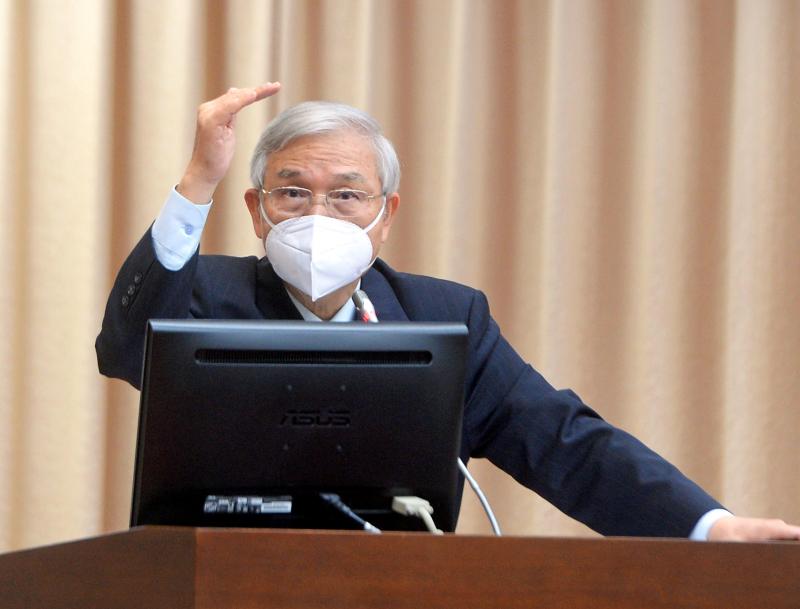The nation’s 4 percent GDP target this year might be difficult to attain, as Russia’s invasion of Ukraine and global monetary tightening is expected to weigh on exports in the second half, central bank Governor Yang Chin-long (楊金龍) said yesterday.
At a meeting of the legislature’s Finance Committee, Yang said that the central bank would revise its growth forecast at its board meeting next month.
The nation’s top monetary policymaker in March said the growth rate was expected to be 4.05 percent.

Photo: Wang Yi-sung, Taipei Times
“GDP growth of 4 percent this year looks increasingly untenable, as unfavorable factors would start to weigh in the second half, even though exports and consumption data have fared quite well thus far,” Yang said.
The war in Ukraine has been termed a “black swan” event — something that was unpredictable and had profound consequences on the global economy — while the rate hikes by the US Federal Reserve have been called a “gray rhino” event — a threat to markets that was predictable, yet largely ignored.
The military conflict in eastern Europe prompted major countries to impose sanctions on Russian oil and gas exports, which drove up international prices for fuel and raw materials.
Global central banks are hiking interest rates to help curb inflation, which is likely to slow economies down.
“The downside risks raise concern over whether growth momentum for Taiwan’s exports can extend into the second half,” Yang said.
Major chipmakers have given rosy earnings guidances for this quarter, while suppliers of laptops and other electronic devices expect declines due to COVID-19 lockdowns in China.
International research bodies have trimmed their forecasts for Taiwan’s GDP growth this year to 3.6 to 3.8 percent, Yang said.
Consumer prices in Taiwan remain high this month after being above 3 percent for the past two months, Yang said.
However, he refused to say unequivocally that the central bank would increase interest rates at next month’s meeting.
“The central bank has made known its stance leaning toward tightening and there are several policy options to achieve that end,” Yang said, citing interest rate hikes, selective credit controls and draining liquidity from the foreign exchange market, among other measures.
The central bank is mulling further selective credit controls, especially in areas with evident housing price hikes, to induce a soft landing, he said.
Policy tools under consideration include shortening mortgage periods and lowering loan-to-value ratios for second-home financing, he said, adding that the current policy only bans grace periods on second-home mortgages.
Shorter mortgage periods, from 20 to 30 years, would prompt borrowers to be more cautious in their financial planning, Yang said.

A magnitude 5.6 earthquake struck off the coast of Yilan County at 12:37pm today, with clear shaking felt across much of northern Taiwan. There were no immediate reports of damage. The epicenter of the quake was 16.9km east-southeast of Yilan County Hall offshore at a depth of 66.8km, Central Weather Administration (CWA) data showed. The maximum intensity registered at a 4 in Yilan County’s Nanao Township (南澳) on Taiwan’s seven-tier scale. Other parts of Yilan, as well as certain areas of Hualien County, Taipei, New Taipei City, Taoyuan, Hsinchu County, Taichung and Miaoli County, recorded intensities of 3. Residents of Yilan County and Taipei received

Taiwan has secured another breakthrough in fruit exports, with jujubes, dragon fruit and lychees approved for shipment to the EU, the Ministry of Agriculture said yesterday. The Animal and Plant Health Inspection Agency on Thursday received formal notification of the approval from the EU, the ministry said, adding that the decision was expected to expand Taiwanese fruit producers’ access to high-end European markets. Taiwan exported 126 tonnes of lychees last year, valued at US$1.48 million, with Japan accounting for 102 tonnes. Other export destinations included New Zealand, Hong Kong, the US and Australia, ministry data showed. Jujube exports totaled 103 tonnes, valued at

BIG SPENDERS: Foreign investors bought the most Taiwan equities since 2005, signaling confidence that an AI boom would continue to benefit chipmakers Taiwan Semiconductor Manufacturing Co’s (TSMC, 台積電) market capitalization swelled to US$2 trillion for the first time following a 4.25 percent rally in its American depositary receipts (ADR) overnight, putting the world’s biggest contract chipmaker sixth on the list of the world’s biggest companies by market capitalization, just behind Amazon.com Inc. The site CompaniesMarketcap.com ranked TSMC ahead of Saudi Aramco and Meta Platforms Inc. The Taiwanese company’s ADRs on Tuesday surged to US$385.75 on the New York Stock Exchange, as strong demand for artificial intelligence (AI) applications led to chip supply constraints and boost revenue growth to record-breaking levels. Each TSMC ADR represents

TRUST: The KMT said it respected the US’ timing and considerations, and hoped it would continue to honor its commitments to helping Taiwan bolster its defenses and deterrence US President Donald Trump is delaying a multibillion-dollar arms sale to Taiwan to ensure his visit to Beijing is successful, a New York Times report said. The weapons sales package has stalled in the US Department of State, the report said, citing US officials it did not identify. The White House has told agencies not to push forward ahead of Trump’s meeting with Chinese President Xi Jinping (習近平), it said. The two last month held a phone call to discuss trade and geopolitical flashpoints ahead of the summit. Xi raised the Taiwan issue and urged the US to handle arms sales to